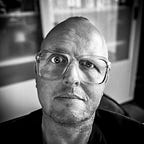You are a relationship
Happyplaces Stories
‘Creativity comes from silence. Everybody’s got a moment to, every day, or a few times a day, to be with themselves. Can you be with yourself? If you think back in a day, most people are never by themselves. Or they’re interacting, or they’re interaction with television, or they’re interacting with radio, with their phone or with their computer. Rarely these days, people are with themselves. And I see that core passion as a voice, but you have all that noise. You can’t hear it with all that noise. You have to sit there with yourself and see what you find. And what you find you may or may not like. It may or may not conform to how you’re living in a certain moment. It could be that you are doing something else, like your job, while you hear that calling, that inner voice within yourself. Then you really need to do a lot of work to listen to that calling. There has got to be a desire, a desire within yourself to go looking.’
I met Devon through Mastermundo, a conference I organised together with the students in 2007, when I was heading the department Interactive/Media/Design (I/M/D) I founded at the Royal Academy or Art in The Hague. I invited her to be one of the speakers. The most of the speakers were more in the realm of technology and design, but Devon came to read poetry and talk about love. Something that was for her, quite vulnerable and risky. sitting inbetween these tech guru’s. But Devon turned out one of the highlights of the event. The highlight, actually.
We kept on talking ever since. Together we decided there was something missing in the study: personal leadership. So I invited Devon to join the team, and she did. Personal leadership turned out to be the missing element in the study to lead students to create unique work.
In one of the many sessions we had together, we decided we needed to frame a couple of principles to clarify to the students what the study was about, like a kind reminder of what you need to consider how things are all linked and connected and what they would become would be the result of. It became a sort of manifesto, which I think, is still valid today:
It is about you x your passion x a subject, or your interest and its context (its place in society, culture, technology, politics, design, the place in people’s heads) x your collegues or peers and their worlds, their network and their worlds x your family and friends and their worlds and their network and their worlds x the facilitators (teachers, staff, people you meet, conferences you go to, things you see and read) and their network and their worlds x the available facilities (studio space, tools, software, hardware, services, resources, libraries) x the body you’re a part of (an agency, a studio, a company, a school) with its network and its place in the world, its network and its world x your own body x containment, structure and discipline x fun x hard work, hard work, hard work, hard work x not being afraid of failing as quickly as possible x not being afraid of your own talent x asking loads and loads of questions x knowing that virtually nothing is imposible x knowing the world has never been so small and that it will become even smaller x knowing that we can’t predict the future, only that it will be even more complex x knowing that you are at the start of everything x knowing you are a relationship.
You are the sum of a lot of things. Things you can choose, and a lot of things you can’t. I had a conversation with Erik de Jong (Spinvis) once, where we also touched this subject.
He firmly stated that we don’t have that much to choose, but have a lot to consider. That a lot of things in our lives are a given because of the contexts, the worlds we’re in, a part of. Those of your parents, family, friends, community, culture, country. All those worlds influence your thinking, your views, perspectives, ideas, beliefs, with their rules, rituals, ceremonies, obligations, agreements. If you don’t know yourself, how will you then know who you can be or can become? How will you then choose?
Like what I wrote earlier:
Everything is different because everybody is different, sees things different based on where they come from, the music they listen to, their upbringing, they’re beliefs, the cities, streets, the space they grew up in. Things that people carry with them but which you cannot see. That what you do, you decide, you create is always good. That it is your unique blend that makes you you and that’s why things can become unique, different, distinct.
Know that you are a relationship. That you are an unique blend of many things. Know that you can influence that blend if you know yourself so you will blend out from the crowd, not in. Bring down the noise. Listen to your calling, your inner voice. Do the work. Go looking. Choose wisely.
Thank you for taking the time to read the article and/or watch the video. I hope that you enjoyed it. If you did, don’t forget to hit the clap button (the icon of the hands below or on the left side of your screen) so I know I connected with you. Follow me here on Medium to automagically see new stories pop up on your Medium homepage. Or follow me on LinkedIn, I also share updates and stories there. Thank you for your support!
